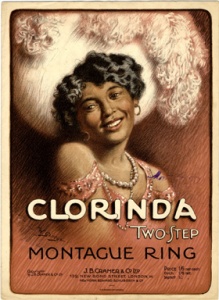Note: This post discusses racist subject matter. Discretion is advised.
This week, we’re back to Britain to meet a composer of many names–and just as many talents.
Amanda Christina Elizabeth Aldridge was born on March 10, 1866 in a suburb of London, England. Her mother was a white opera singer (and supposed Swedish countess) Amanda Pauline von Brandt and her father was the famous Black Shakespearean actor Ira Aldridge, who also was a talented singer.
Because of her parents’ musical background, Aldridge and her siblings’ musical talents were strongly encouraged. Her mother would take them to classical music concerts at the famed Crystal Palace, and Aldridge was able to study both singing and piano almost from the start of her life. And it paid off–when she was fifteen, Aldridge sang with an orchestra at the very same Crystal Palace she’d visited as a little girl!
When she was seventeen, Aldridge won one of nine scholarships for singers to study at the Royal College of Music–the same college where Samuel Coleridge-Taylor studied first violin and then composition. There she was lucky enough to study with the famous Swedish soprano Jenny Lind, who had a music teacher in common with her mother.
Aldridge was an excellent student who had very good report cards, and within three years of starting classes at the Royal College of Music, she began her performance career. It was here she started using another name: Amanda Ira Aldridge. She was proud of her father’s achievements and wanted to show it–and to show that she had inherited every bit of his genius.
At her performances, she sang a wide range of music, including works by Samuel Coleridge-Taylor and Maud Valérie White (soon to be featured on History Hunt!). She became a very popular singer who received excellent reviews praising not only her voice but her intelligence–impressive for the prejudiced time she lived in.
Later, Aldridge took on yet another name: Montague Ring. This time, however, she used it not for performing, but for composing.
Her first published piece was called “Clorinda.”
Her next compositions, however, are harder to understand. During this time, in Britain and the United States, there was a type of music that was very popular, called “coon songs.” They were used by white people to laugh at black people and the way it was thought they lived. In Britain, many people didn’t know that these songs weren’t a normal part of American music, but that didn’t mean the songs weren’t very racist. And while most composers of “coon songs” were white, not all of them were.
It’s hard to know what Aldridge’s reasons were for writing such ugly music. She might have been one of the people to think these songs were only an American tradition. She might also have been affected by the racism of the time. When someone is surrounded by people telling them they aren’t as good as everyone else, even if they know the others are wrong, it can be hard not to believe it a little. Regardless, it’s important to remember that this music once existed so that we can learn to never make it again.
That said, Aldridge was still a skilled composer, and she made sure that many of her pieces weren’t too hard for ordinary people to play. She also worked with local poets and African American poet Paul Laurence Dunbar to promote their works through her music.
Even when she was busy with composing, Aldridge continued to perform. In fact, she and her sister Luranah even performed together in a concert in 1914, taking turns singing.
Unfortunately, Aldridge’s singing career ended too soon: a bad case of laryngitis left her voice damaged. She could sing short phrases, but she could no longer perform as she once had. She also stopped publishing her compositions–her last piece was released in 1934–and maybe stopped composing altogether. No one knows why. But she still didn’t give up on music, because by that time, she had become an extremely well-respected singing teacher. In fact, some of the greatest singers of her time studied under her, including Paul Robeson, Roland Hayes, and Marian Anderson–previously featured on History Hunt!
Aldridge kept teaching long past the age most music teachers retire. In fact, when someone asked her when she was eighty-seven if maybe it was time to slow down, she answered, “Life without music would be unbearable. I cannot keep still. So many things are happening that I must be active to see it all.” (Andrews) And the very next year, Aldridge appeared on the TV show Music For You, even though she didn’t actually own a TV herself!
Unfortunately, most of Aldridge’s music is out of print, and so I was unable to find an example of her work to share. If anyone knows where I can find any of her music to listen to, I’d greatly appreciate it.
If you’re enjoying the History Hunt series, why not drop me a tip or subscribe to me at Patreon? History Hunt will always be free–this is just an option for my readers to show their appreciation.
To Learn More (Sources):
Amanda Aldridge, Teacher and Composer: A Life in Music by Joyce Andrews (Note: Outdated terminology for black people is used in this article. Mature subject matter is also discussed.)
Aldridge, Amanda Christina Elizabeth [pseud. Montague Ring] on Oxford Index
Amanda Christina Elizabeth Aldridge on Wikipedia
List of music students by teacher: A to C: Amanda Christina Elizabeth Aldridge on Wikipedia
Amanda Christina Elizabeth Aldridge, aka Amanda Ira Aldridge on POC in Western Music History (Note: Tumblr is a 13+ website. This article is safe for all ages.)
Image source for image of Clorinda
In Search of Coon Songs, Racial Stereotypes in American Popular Song on The Parlor Songs Academy (Note: Discussion of racist subject matter and racist imagery in the article. Discretion strongly advised.)

One thought on “History Hunt: Amanda Christina Elizabeth Aldridge”